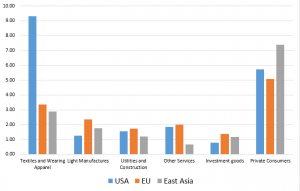Customized Data
Understanding the underlying economic data in a computable general equilibrium (CGE) model is crucial to understanding the model results. A fully reconciled database, usually based on the GTAP Data Base, underlies the model theory. Datasets of tariff and non-tariff barriers and forecasts are drawn upon for building realistic scenarios. New ideas and theory usually require new reconciled datasets be added to the existing data and models.
The ImpactECON team has over 20 years of experience using and building detailed global and country datasets for economic analysis. This experience enables the team to tailor models and analysis to best meet the needs of our clients. Specifically, ImpactECON staff have extensive experience using:
- global trade and protection datasets;
- the latest datasets on non-tariff barriers in goods and services and trade facilitation;
- national accounts, country censuses and household surveys;
- global labor, financial, migration and energy-related databases;
- and global forecasts.

Average tariffs applied to light manufactured goods from China purchased by selected industries, for investment purposes, and by final consumers in USA, Europe and East Asia
Most recently, ImpactECON have developed a global supply chain database that includes imports by commodity, agent (consumers, government and industry), source and destination, as well as differential tariffs by agent, source and destination. This database allows for analysis of the impact of policy shocks on global supply chains, information that is unavailable in the standard GTAP Data Base.
ImpactECON staff have developed one of the most cited databases applied in CGE modeling of Trade Facilitation Analysis, “The GTAP Time as a Barrier to Trade Database” based on work by Dr. David Hummels of Purdue University.
ImpactECON has also created databases and data programs for the development of global growth scenarios and dynamic policy applications. These include: macroeconomic forecasts, tariff scenarios for implementing ratified trade agreements over time, data sets linking labor force growth by education to labor by occupation over time, foreign capital flows, and measures of convergence.
ImpactECON staff have used country censuses and household surveys to extract key information in order to build large global datasets and to supplement country-specific modeling in the MyGTAP model. We can also work with clients to develop survey instruments to collect additional information to build global datasets, for instance in the area of NTBs.
With their knowledge of underlying datasets, ImpactECON staff have also contributed significantly to the development of the GTAP Data Base and to several important extensions, including:
- the first generation GTAP supply chain database;
- the inclusion of labor by 5 occupational groups;
- the global migration database (GMig2) ;
- the emissions databases; and
- a foreign direct investment database.
We have also assisted contributors from numerous countries in the incorporation of their country’s data into the GTAP Data Base. For instance, ImpactECON worked with the Center for Global Trade Analysis, and directly with several African contributors, to include new African countries into a special Africa-focused GTAP database.
Where clients are interested in the impact of policies on particular industries not suitably covered in the 57 GTAP sectors, ImpactECON can work with clients to incorporate additional commodity and sectoral information in order to disaggregate the relevant sector/s from the GTAP Data Base prior to analysis. This ensures that the impact of policies can be ascertained at a more detailed industry level.
Whether you require a custom-built database, your industry specifically identified, or access to one of our databases, ImpactECON can help you meet your goals.
